🔑 UNLOCKING GROWTH
Leveraging Content Marketing to Accelerate Life Science Company Growth
Let’s set up a time to discuss your situation and find the best options for your business growth.

Jill Roughan, PhD
Founder and President

Jill Roughan, PhD
Founder and President
Executive Summary
As personalized medicine and a burgeoning array of therapeutic options gain prominence, patients and their caregivers increasingly seek information about approved therapeutics and clinical trials. This growing interest is revolutionizing marketing, steering it towards more direct-to-consumer models. Given the vital importance and inherent risks of life science products, it is imperative to adopt a safe, regulated, and educational approach. By providing comprehensive and trustworthy information, we can empower people to make informed choices aligned with their personal health priorities.
To successfully market these innovative technologies and options, it is crucial to build awareness and trust. Effective content marketing is essential to achieving this goal. However, readiness for content marketing comes with challenges that demand leadership with digital expertise, teams proficient in AI and digital tools, data literacy, and the creation of AI content readiness policies.
At present, there is a scarcity of professionals with a comprehensive understanding of science, AI, and life science marketing. This white paper offers a roadmap to achieve digital content marketing excellence, strengthen brand trust, and drive long-term sustainable growth for life science companies.
Rapid Growth of Life Science Clinical Trials and Product Launches
The Life Sciences sector is undergoing a transformative era driven by unprecedented advancements in technology, research, and clinical practices. Over the next decade, the industry is poised to experience a significant surge in clinical trials and product launches, especially in gene therapy, personalized medicine, and direct-to-consumer clinical trials1. Numerous key factors are contributing to this rapid growth, carrying profound implications for life science companies.

Direct-to-consumer (DTC) clinical trial recruitment strategies engage patients directly, simplifying their understanding of options and participation in clinical trials. Digital platforms facilitate connections between patients and trials that align with their health profiles and preferences. This approach allows for a more diverse pool of participants, resulting in more representative and generalizable trial outcomes. Additionally, digital tools and platforms expedite the recruitment and compliance process, thereby reducing the time required to achieve and keep the desired sample size.
Rise of Diagnostic Testing Driving Personalized and Preventative Medicine
Advances in genomics have made genetic testing more accessible and affordable allowing for early detection and prevention of diseases2. Personalized medicine is shifting focus from a one-size-fits-all approach to treatments tailored to individual patients’ genetic profiles. Early detection through genetic testing enables preventive measures and lifestyle modifications that can reduce the risk of developing serious health conditions.
This early diagnosis will inevitably result in more individuals receiving preventive and early-stage treatment. Newly diagnosed patients and their caregivers deserve access to comprehensive information about therapeutic options, ensuring they are well-prepared for their journey and discussions with their physicians.
Accelerating R&D Innovation with Artificial Intelligence Enablement
The extent and timing of artificial intelligence (AI)’s impact on drug development remain uncertain, but its transformative influence is inevitable. As AI technologies continue to evolve, they promise to revolutionize various aspects of the drug development process.
AI technologies will revolutionize the drug discovery process by streamlining target identification and compound screening while predicting efficacy and safety profiles with greater accuracy. This includes repurposing existing drugs to treat different diseases by connecting the dots from disease to drug, as well as optimizing gene therapy vectors. Additionally, AI is enhancing clinical trial design, patient recruitment, and data analysis, resulting in more efficient trials and faster regulatory approvals3.
Preparing to Fuel Business Growth with Digital Content
Is your marketing team prepared to meet the demand for personalized life science products? To effectively reach and educate your audience, you will need a wealth of compelling content. While digital content marketing offers immense growth potential, life science companies often face significant challenges that can impede their progress. Understanding and addressing these challenges is crucial for harnessing the full power of digital content marketing in the life science industry.
Leveraging Digital Marketing Insights in Pharma Encounters Challenges in the Current Ecosystem
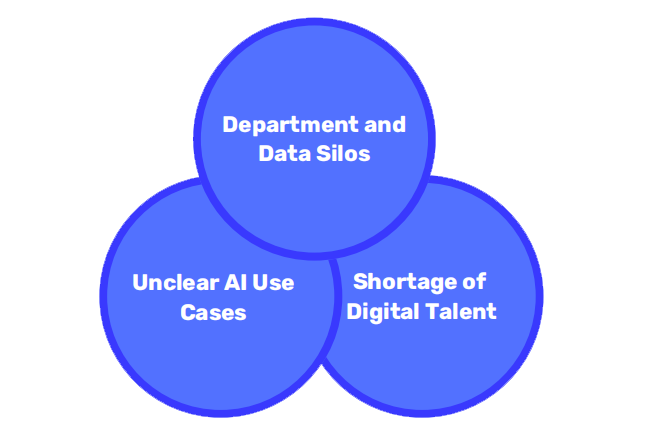
Department and Data Silos Hindering Effectiveness
Data and department silos can significantly hinder the effectiveness of digital content marketing strategies and tactical execution. When data and insights are isolated within individual departments, it creates barriers to collaboration and information sharing. This fragmentation leads to inconsistent messaging, duplicated efforts, and missed opportunities for leveraging comprehensive data insights. Breaking down these silos is essential for creating a unified content strategy, ensuring that all teams work towards common goals with access to the same information, ultimately enhancing efficiency and driving better business outcomes.
Unclear Artificial Intelligence Use Cases
In building digital marketing capabilities within life sciences, unclear artificial use cases present a significant challenge. As AI becomes more integrated into marketing strategies, many organizations struggle to identify specific, high-value applications that align with their goals. Without clearly defined use cases, AI initiatives often lack focus, leading to wasted resources and missed opportunities. For life science companies, this can mean the difference between leveraging AI to deliver precise, targeted campaigns or being overwhelmed by complex data with no actionable insights. Defining clear AI use cases is crucial for developing effective digital marketing strategies that not only enhance customer engagement but also drive measurable outcomes, such as improved lead generation, personalized content delivery, and optimized ROI.
Shortage of Proficient Life Science Digital and AI Talent
The rapid advancement of digital and AI technologies has outpaced the availability of skilled professionals in the life sciences sector. This talent gap hinders the ability of companies to implement sophisticated digital strategies and leverage AI effectively. The demand for digital and AI talent is high across various industries making it challenging for life science companies to attract and retain the best talent4.
The vast amount of data generated in life science marketing campaigns can be overwhelming for employees, particularly those without a strong background in data analysis. Misinterpretation or underutilization of life science commercialization and customer data can result in ineffective content strategies that fail to resonate with the target audience.
Overcoming These Challenges Through Building a Center of Digital Content Marketing Excellence
Establishing a Center of Digital Content Marketing Excellence is crucial for overcoming challenges that impede business growth. This strategy addresses limitations in leadership, data interpretation, and talent while fostering a culture of continuous improvement and innovation. Additionally, it helps your company build long-term relationships and trust with your target audience.
By consolidating digital content marketing expertise in one center, companies can ensure consistent, high-quality content creation and strategy execution. Mastery of producing high-quality, trustworthy content enhances brand reputation and customer loyalty, leading to sustained growth5. Effective leadership ensures that every piece of content is aligned with the company’s values and goals.
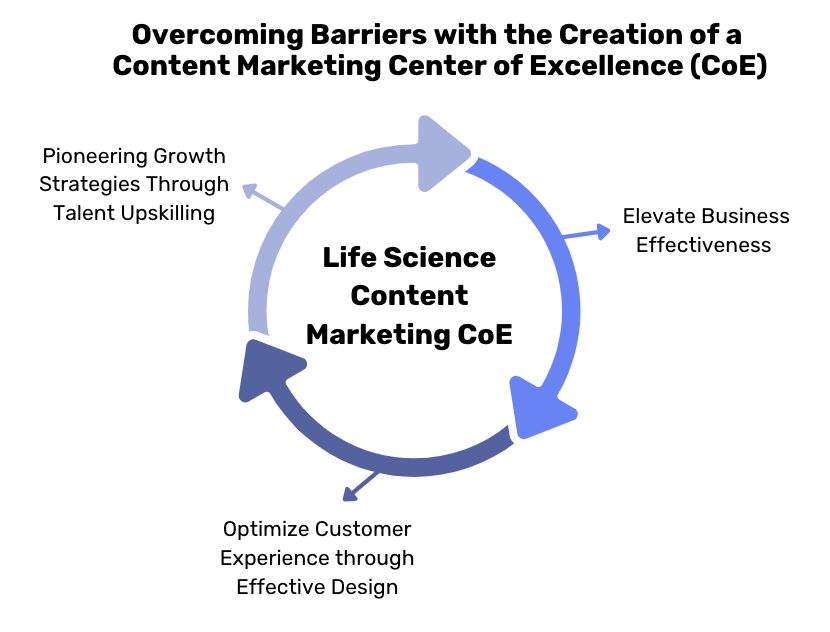
Elevating Business Effectiveness Through Content Leadership
Effective life science content leadership is essential for providing direction, vision, and the framework needed for success. Strong leadership in digital content marketing fosters a culture of excellence and continuous improvement, particularly in the life sciences industry, where accurate communication is vital. Leaders set clear goals and expectations, align teams with the company’s strategic vision, and ensure that all content initiatives support broader business objectives. They also play a crucial role in mentoring and developing talent, helping team members grow their skills, and staying updated with the latest industry trends and technologies.
Content leaders facilitate cross-functional collaboration, breaking down silos between departments such as marketing, IT, sales, and regulatory affairs. This integrated approach ensures that content strategies are comprehensive and that all aspects of the company’s operations contribute to a cohesive digital marketing effort. Leadership also drives innovation by encouraging experimentation and the adoption of new technologies, such as AI and data analytics, to enhance content marketing efforts. By fostering an environment where new ideas are tested and implemented, leaders can keep the company at the forefront of the industry.
Optimizing Customer Experience through Effective Design
Effective design is a cornerstone of optimizing the customer experience in the life sciences sector. By employing design thinking principles, companies can create user-centered content and interfaces that resonate with their audience. Design thinking involves empathizing with users, defining their needs, ideating creative solutions, prototyping, and testing. This iterative process ensures that the final product is both functional and appealing. Good design enhances usability, accessibility, and engagement. Well-structured content with clear visuals and intuitive navigation can significantly improve user satisfaction and retention. In the context of digital marketing, effective design can simplify complex scientific information, making it more accessible and engaging for diverse audiences, from healthcare professionals to patients.
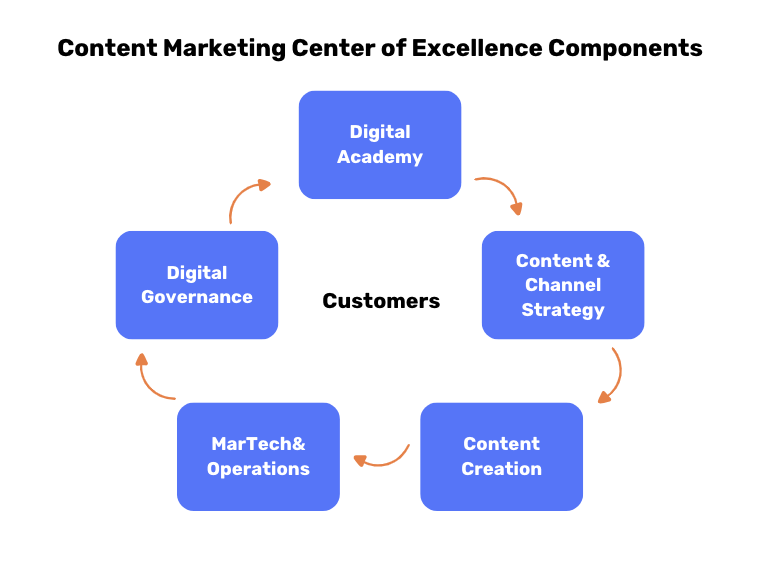
Pioneering Growth Strategies Via Digital Talent & AI Upskilling
Establishing a center of excellence involves investing in the continuous development of internal talent through training and upskilling programs. Regular workshops on science and market trends, along with coursework or certifications in digital marketing, empower employees to continuously add value. Nurturing a culture of innovation through continuous learning and growth strategies, driven by a well-trained and upskilled workforce, will lead to significant competitive advantages and market leadership.
Leveraging data synthesis allows companies to gain deeper insights into customer needs and preferences. For example, a pharma company can use data analytics to understand patient concerns and tailor their content accordingly, resulting in higher engagement rates. Having a team that is proficient in data literacy can quickly adapt content strategies based on real-time data and insights, ensuring relevance in a constantly changing market. Continuous adaptation to market trends and customer feedback enhances the customer experience and keeps the brand relevant and competitive.
Steps to Build Out of Life Science Content Marketing Capabilities
Building out content marketing capabilities involves mapping out distinct stages tailored to each company’s unique needs and goals. This process typically begins with a thorough content and resource audit to identify existing strengths and gaps. Next, a strategic plan is developed, aligning content goals with business objectives. Hiring the right talent based on the strategy ensures that the necessary skills are in place to execute the plan effectively. Finally establishing clear workstreams for content development, review, and performance measurement ensures streamlined operations and continuous improvement. This customized approach allows each company to develop a robust and effective content marketing framework that supports long-term growth.
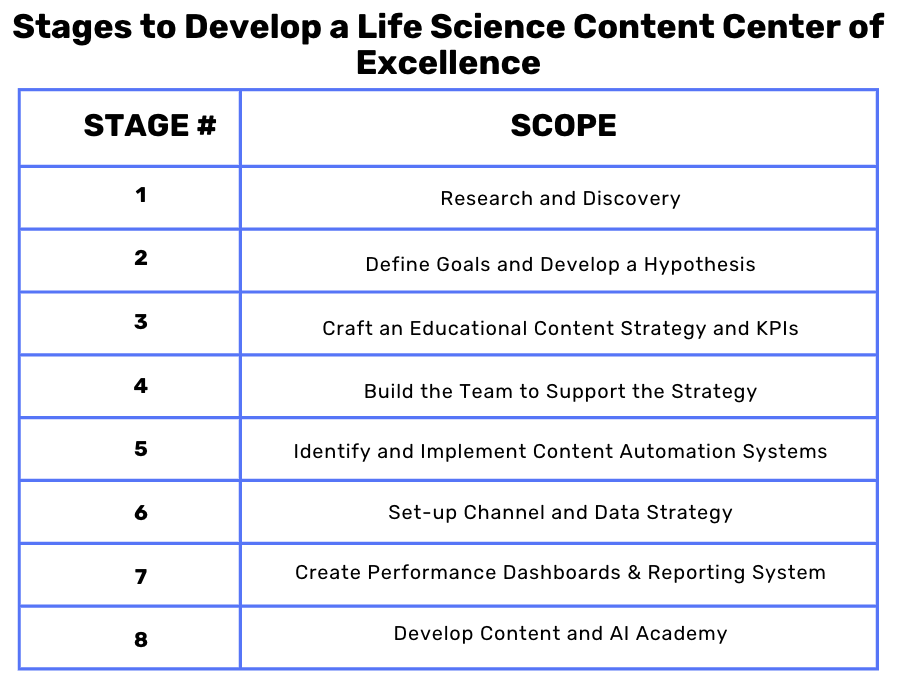
Step 1: Perform Content and Resource Audit
Conducting a comprehensive content and resource audit is foundational to refining your content marketing strategy. This function involves evaluating the scope and structure of your organization, understanding your unique science and technology offerings, and assessing your product market fit. It also entails identifying your main customers and end-users, their demographics, and their decision-making process. Analyzing competitors’ marketing strategies and pricing structures provides insights into market positioning. This audit process lays the groundwork for aligning content efforts with business objectives and enhancing overall marketing effectiveness.
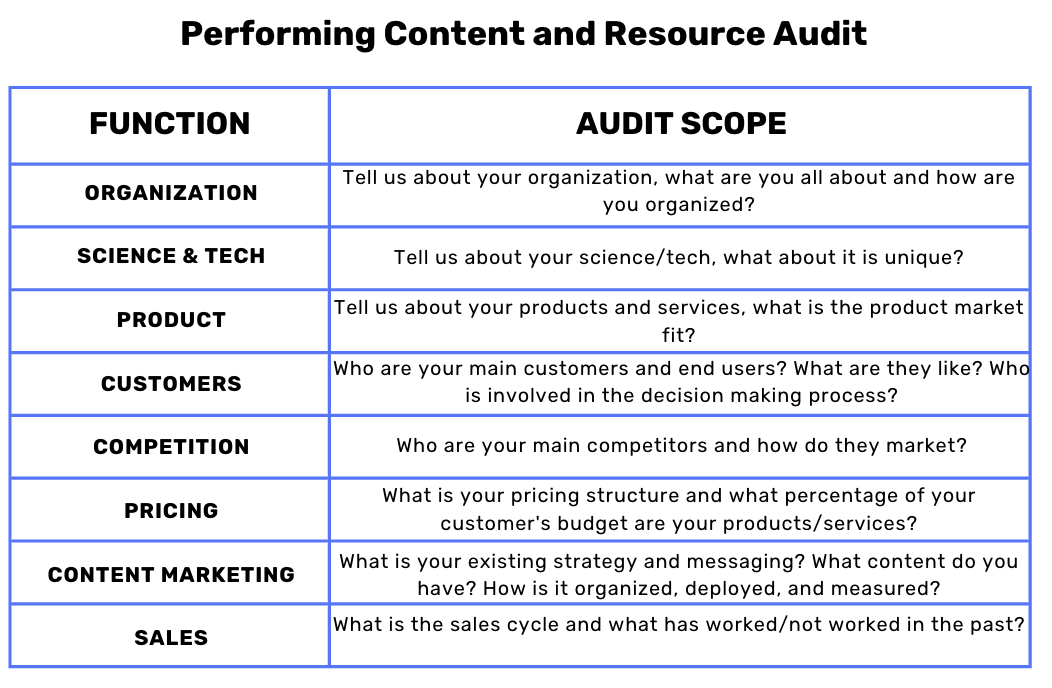
Step 2: Create and Build out a Content Strategy
Building a robust content marketing strategy is crucial for achieving business objectives and maximizing digital presence. Several key content objectives to drive engagement and traffic including to boost brand awareness, attracting more users to the website and improving engagement. It’s important that for each strategy you are targeting a specific audience, understanding their pain points and what unique perspective your internal team will have on a particular topic. These strategic initiatives can be tracked and measured using specific metrics and integrated into a comprehensive dashboard for real-time performance monitoring and adjustment.
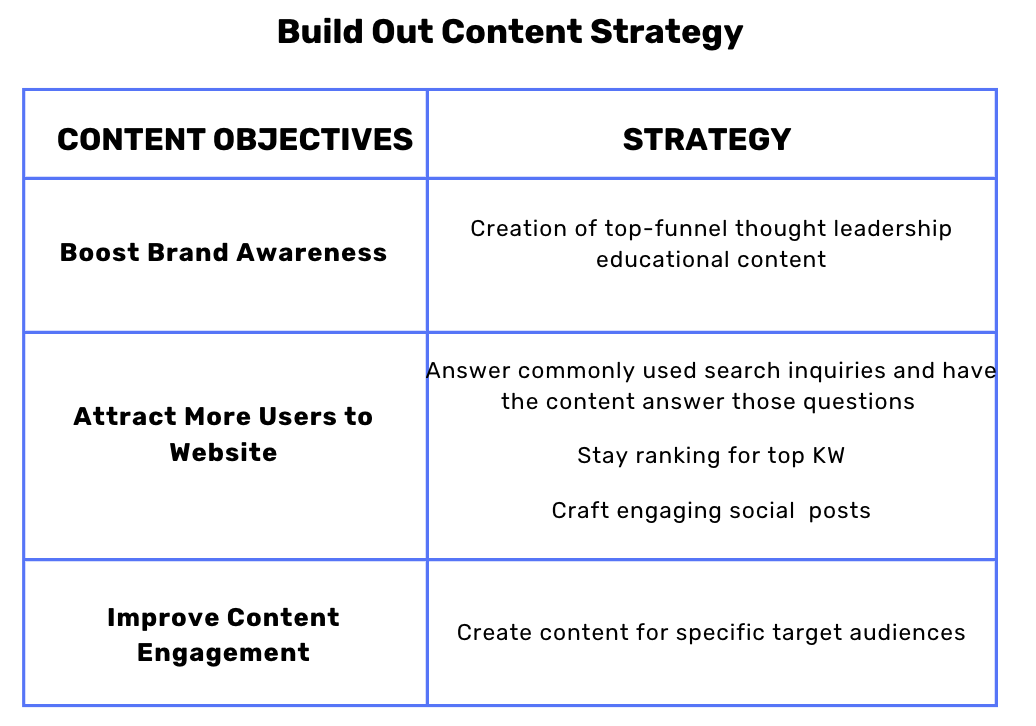
Step 3: Strategic Hiring Based on Your Business Strategy
To execute a successful content marketing strategy in the life sciences sector, hiring individuals with specialized skills and attributes is paramount. These roles require expertise in crafting scientifically accurate and engaging healthcare content, navigating the complexities of the healthcare provider and patient journey, and ensuring compliance with privacy and security standards. Proficiency in data management and analytics is essential for leveraging insights to drive strategy and optimize performance across digital platforms.
Technical competencies encompass website management, SEO, digital advertising, and digital PR, supported by knowledge of GenAI policies and prompt engineering capabilities. By assembling a team equipped with these skills and attributes, companies can effectively communicate their brand’s value, enhance their digital presence, and achieve strategic goals in a rapidly evolving industry landscape.
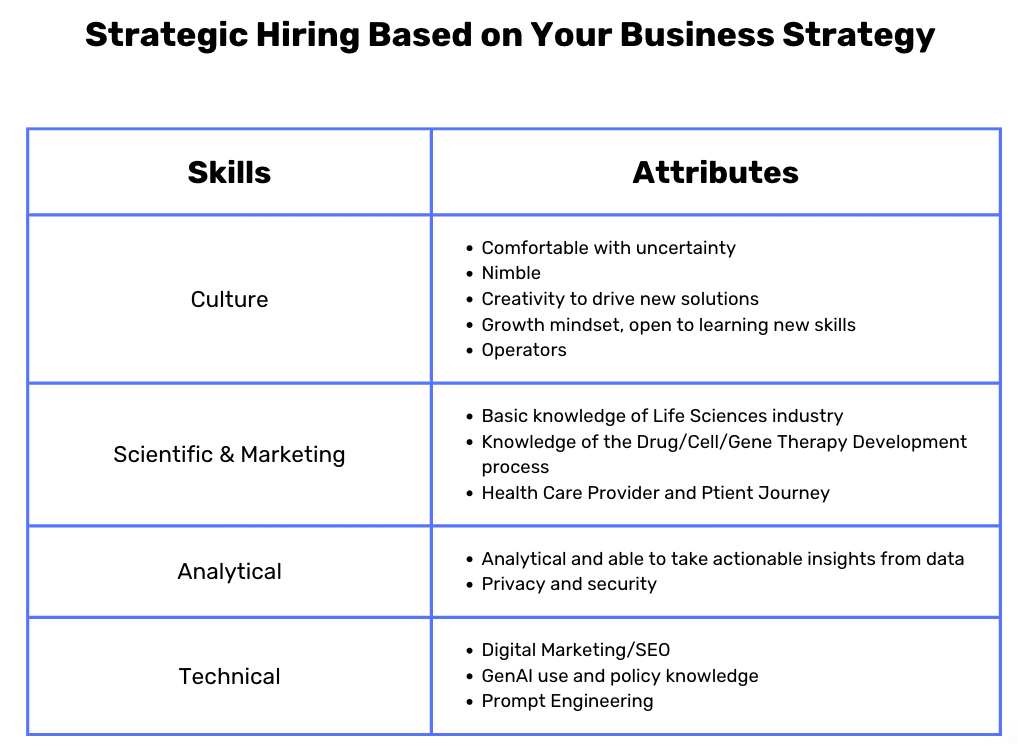
Step 4: InterDepartmental and InterAgency Workstream Creation
Establishing a streamlined process for content development, review, and publishing is essential for maintaining high-quality output. This involves collaborative planning and creation, rigorous review stages to ensure accuracy and compliance, and efficient publication across appropriate channels. By optimizing these processes, life science companies can ensure their content is not only relevant and engaging but also timely and compliant with industry standards.
Streamlined development of workstreams essential for optimizing digital content marketing in the life sciences sector is crucial for effective Content Marketing Centers of Excellence to Operate Efficiently. The integration of various specialized workstreams ensures cohesive and efficient operations, enhancing overall productivity and effectiveness.
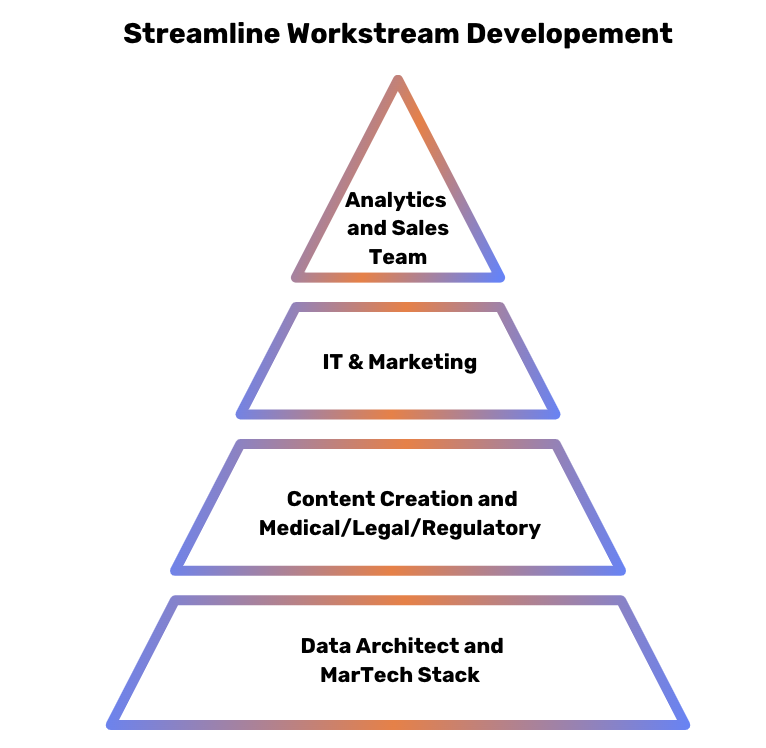
Elevating Pharma Content Marketing with Phlo
Our proven process, Pharma Launch Optimizer (Phlo), is designed to enhance pharmaceutical digital marketing capabilities through capability building, internal team upskilling, and content strategy support services. Phlo focuses on leveraging existing organizational strengths, eliminating the need to reinvent the wheel. We collaborate closely with internal stakeholders, learning by doing to ensure seamless integration. Our priorities include trust, compliance, and innovation, utilizing AI-driven solutions to optimize workflows and enhance customer experiences. This approach ensures not only strategic success and immediate gains but also the development of internal capabilities and habits that will benefit your company and patients in the long term.

References
- Hardman TC, Aitchison R, Scaife R, Edwards J, Slater G. The future of clinical trials and drug development: 2050. Drugs in Context. Published June 8, 2023.
- Dobrindt A, Willard JO. Redefining clinical trials: Adopting AI for speed, volume and diversity. Published May 6, 2024.
- Forward-Looking Advances for Human Genetics and Genomics. Published 2024. Accessed July 17, 2024.
- Maurer R. Rising Demand for Workforce AI Skills Leads to Calls for Upskilling. Published February 13, 2024.
- Pemberton C. Key Findings From the Gartner Customer Experience Survey. Published March 16, 2018.


